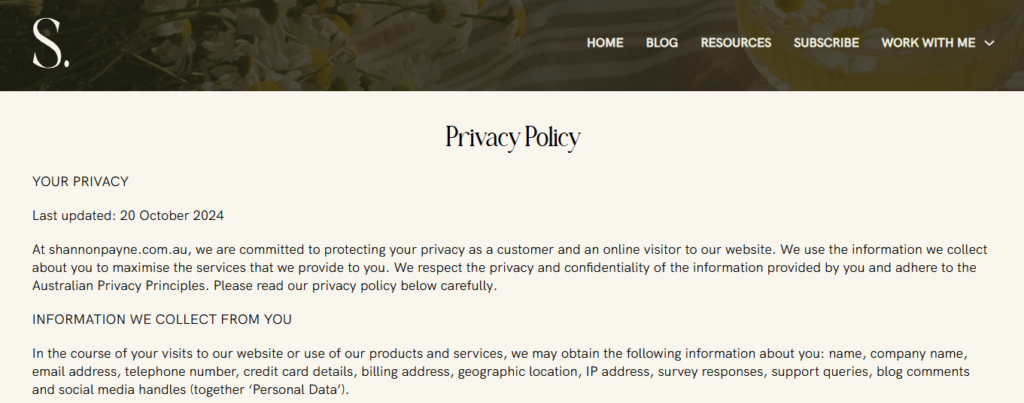Disclaimer: I’m not a legal professional, and this blog post is based on my own reading, research, and experience as a website designer for small businesses. This information is general in nature and not legal advice. Always seek professional legal advice for your specific circumstances.
If you’re a small business owner in Australia, you might be wondering: “Do I really need a Privacy Policy on my website?” Spoiler alert: if you’re collecting any personal information (like email addresses, contact form submissions, or customer details), the answer is probably a big YES. 😉
But don’t stress! In this post, I’ll break it down in plain English, so you know exactly what you need, why it matters, and how to get it sorted without the legal headaches.
Why Privacy Policies Matter (Even for Small Websites)
Think of a Privacy Policy as your way of saying, “Hey, I respect your info and here’s how I’ll use it.” It’s all about building trust with your website visitors (and in Australia, it’s also about following the law).
Key reasons you need a Privacy Policy:
- Legal Compliance: Australia’s Privacy Act 1988 (and updates like the Australian Privacy Principles, or APPs) require certain businesses to have a Privacy Policy.
- Trust and Transparency: People want to know how their data is being used — and they’ll trust you more if you’re upfront.
- Third-Party Services: If you use tools like Google Analytics, Facebook Ads, or email marketing software, they often require you to have a Privacy Policy.
- Legal Obligations: Following Australian Privacy Laws is a legal requirement for many website owners.

Does Every Australian Website Need a Privacy Policy?
Not necessarily… but most should have one. Here’s the quick breakdown:
You must have a Privacy Policy if:
- You have an annual turnover of more than $3 million.
- You collect “sensitive information” (like health information, sexual orientation, or criminal record data) regardless of turnover.
- You’re a health service provider.
- You sell customers’ personal data or personal information to third parties.
You should have a Privacy Policy if:
- You collect any personal info via a contact form, sign-ups, comments, orders, etc.
- You use cookies, tracking tools, or third-party services like an internet service provider for hosting.
- You want to look professional and trustworthy (which you do, right?)
Psst… Even if you’re technically “too small” to legally require one, having a Privacy Policy is a low-effort, high-trust win. 🌟
(Read more about Australian Privacy Laws here)
What Should an Australian Website Privacy Policy Include?
Your Privacy Policy doesn’t have to be a scary, 20-page document filled with legal jargon. Keep it clear, cover the essentials, and you’re golden.
Here’s what to include:
- What personal info you collect (e.g., names, email addresses, credit card details)
- How you collect it (forms, cookies, subscriptions, web browser cookies)
- Why you’re collecting it (to respond to enquiries, send newsletters, marketing purposes)
- How you store and protect it (to prevent unauthorised access and ensure data security)
- Who you share it with (third-party services like Stripe, Mailchimp)
- How users can access or correct their data (correction of personal information)
- How users can make a complaint about a breach of the APPs or your privacy practices
- Your contact details
It’s also a good idea to include a cookie policy, privacy statement, and explain your disclosure of personal information where applicable.
How to Create a Privacy Policy for Your Website
Good news: you don’t need to reinvent the wheel.
Options to get started:
- Buy a template! Easiest option and one of the more affordable. I personally use and recommend Legal123 for online legal templates.
- Hire a lawyer for a fully customised, compliant privacy policy (especially if your business collects sensitive data).
- DIY it using a template – but make sure you tailor it to your business and specific circumstances.
(Pro tip: Always update your Privacy Policy and date Privacy Policy updates if your data collection or privacy practices change.)
If your business deals with online stores, online services, or processes unsolicited personal information, having comprehensive privacy policies and clear terms of use is essential.
Wrapping Up: Yes, You Probably Need One!
So, do you need a Privacy Policy on your Australian website? If you’re collecting any kind of user information, even just a name and email, it’s smart (and often legally necessary) to have a website privacy policy that meets applicable laws like the Australian Privacy Act.
Plus, it’s a small step that makes a huge difference in building trust with your potential customers.
You’ve got this. 👊


